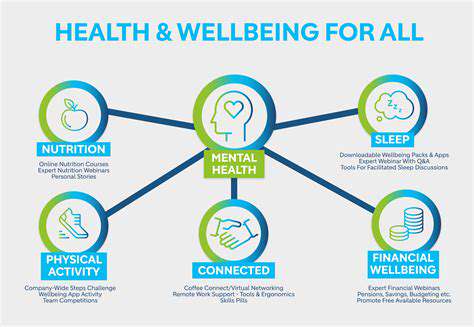The Green Brain: Sustainable Nutrition for Cognitive Vitality
A balanced and nutritious diet is paramount for optimal brain function. Consuming a variety of foods rich in essential vitamins, minerals, and antioxidants is crucial for supporting healthy brain cells and promoting cognitive processes. This includes fruits, vegetables, whole grains, lean proteins, and healthy fats. These foods provide the building blocks necessary for neurotransmitter production, crucial for communication between brain cells. Furthermore, adequate hydration is essential for proper brain function, as the brain is composed primarily of water.
Specific nutrients, like omega-3 fatty acids found in fatty fish and nuts, play a vital role in maintaining brain structure and supporting cognitive function. These healthy fats are essential components of brain cell membranes, influencing their fluidity and communication efficiency. A deficiency in these crucial nutrients can negatively impact memory, focus, and overall cognitive performance.
The Impact of Macronutrients on Mental Clarity
Macronutrients, including carbohydrates, proteins, and fats, provide the energy needed for daily activities, including brain function. Complex carbohydrates, found in whole grains and fruits, offer sustained energy release, promoting stable blood sugar levels, which are vital for maintaining mental clarity and focus. A consistent intake of complex carbohydrates can help prevent energy crashes and improve concentration throughout the day.
Protein, the building block of life, is essential for the synthesis of neurotransmitters and the maintenance of brain health. Lean proteins, found in fish, poultry, beans, and lentils, are crucial for various cognitive functions, including memory and learning. A balanced intake of protein ensures the proper functioning of brain processes and contributes to overall cognitive well-being.
The Influence of Micronutrients on Brain Health
Micronutrients, including vitamins and minerals, are essential for various bodily functions, including brain health. Vitamin B vitamins, particularly B12, play a critical role in nerve function and the production of red blood cells, which carry oxygen to the brain. Adequate intake of these vitamins is crucial for optimal cognitive function and preventing neurological issues. Vitamin D also plays a significant role in brain health and cognitive function.
Iron, another vital micronutrient, is necessary for the transport of oxygen throughout the body, including the brain. Adequate iron intake is essential for maintaining healthy brain cells and preventing cognitive decline. Zinc is also necessary for the production of neurotransmitters and supporting brain development. A deficiency in any of these micronutrients can lead to cognitive impairments and various health issues.
The Importance of Hydration and Sleep for Optimal Brainpower
Proper hydration is fundamental to brain function, as the brain is composed primarily of water. Dehydration can impair cognitive performance, leading to difficulties with concentration, memory, and mood. Maintaining adequate hydration throughout the day is essential for optimal brain function and overall well-being.
Sleep is crucial for consolidating memories, processing information, and restoring brain function. A consistent sleep schedule and adequate sleep duration are essential for optimal cognitive performance. Lack of sufficient sleep can negatively impact various cognitive functions, including memory, attention, and decision-making, leading to reduced overall brainpower.
The foundation of any successful endeavor lies in a thorough understanding of the underlying principles. This is particularly crucial in complex fields like engineering and scientific research, where a robust grasp of fundamental concepts is essential for progress. Without a solid foundation, even seemingly simple tasks can become insurmountable obstacles, leading to wasted time and resources. A firm understanding ensures that projects are built on a strong base, reducing the likelihood of errors and promoting lasting success.
Beyond the Plate: Lifestyle Factors for Optimal Brain Health
Nourishing Your Brain from Within
A healthy brain isn't just about what you eat, but also about how you live. Consistent, mindful choices regarding your diet, sleep patterns, and stress management contribute significantly to optimal cognitive function. Prioritizing a balanced diet rich in antioxidants, healthy fats, and essential vitamins and minerals provides the building blocks for brain cells to thrive. Furthermore, understanding and managing stress is crucial. Chronic stress can negatively impact memory and cognitive performance, so incorporating stress-reducing activities like meditation, yoga, or spending time in nature can foster a more resilient and healthy brain.
Adequate sleep is another vital component. During sleep, the brain consolidates memories, clears out toxins, and repairs itself. Aiming for 7-9 hours of quality sleep each night is essential for optimal cognitive function and overall well-being. Establishing a regular sleep schedule, creating a relaxing bedtime routine, and ensuring a conducive sleep environment are all key strategies to enhance sleep quality and support brain health. Consistent sleep patterns are crucial for sustained brain health.
The Power of Physical Activity and Mental Stimulation
Regular physical activity isn't just good for your body; it's fantastic for your brain. Exercise increases blood flow to the brain, delivering essential nutrients and oxygen that are crucial for healthy brain function. Engaging in regular physical activity, such as brisk walking, jogging, or swimming, can help improve memory, focus, and overall cognitive abilities. Beyond physical activity, engaging in mentally stimulating activities is also vital. Learning new skills, playing brain games, reading books, or engaging in conversations can help maintain and enhance cognitive function as we age.
Social connections are equally important for maintaining brain health. Maintaining strong social connections and engaging in meaningful relationships provides emotional support and can help stimulate the brain. Social interaction can help stave off feelings of isolation and depression, which are detrimental to cognitive health. Connecting with loved ones, joining clubs or groups, or simply spending time with friends can significantly impact your mental well-being and contribute to a sharper, healthier brain.
Maintaining a positive and active lifestyle, encompassing adequate sleep, regular physical activity, and engaging in mentally stimulating activities, along with strong social connections, plays a vital role in nurturing a healthy brain. These elements are not merely supplemental but rather integral parts of a holistic approach to optimizing cognitive function and overall well-being.












